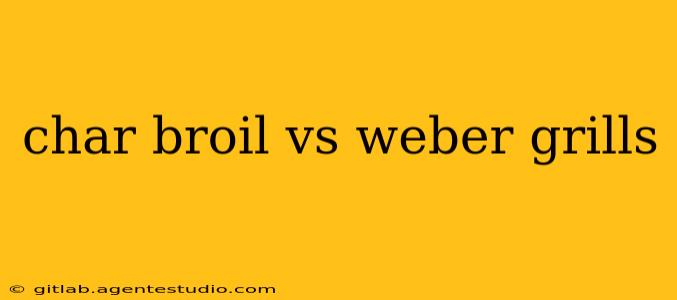Choosing the right grill can feel like navigating a culinary minefield. Two titans consistently dominate the conversation: Char-Broil and Weber. Both offer a wide range of grills, from budget-friendly options to high-end, feature-packed machines. But which brand reigns supreme? This in-depth comparison will help you decide which grill best fits your grilling needs and budget.
Price and Value: A Tale of Two Ranges
One of the most significant differences lies in pricing. Char-Broil generally offers more affordable options, making them an attractive choice for budget-conscious grillers. You can find a decent Char-Broil grill for under $200, whereas Weber's entry-level models typically fall within a higher price bracket. However, this price difference often reflects differences in build quality and features.
Weber grills, particularly their kettle grills and Genesis series, are known for their durability and longevity. While the initial investment is higher, they often last for many years, potentially saving you money in the long run by avoiding frequent replacements.
Build Quality and Durability: A Heavyweight Showdown
Weber consistently receives praise for its robust construction and superior materials. Their grills are often made with thicker gauge steel, resulting in greater resilience to rust and warping. Weber's iconic kettle grills are legendary for their longevity, with many lasting decades with proper care.
Char-Broil grills, while functional, often utilize thinner materials. This can lead to concerns about durability and longevity, especially in harsher weather conditions. However, Char-Broil has made strides in recent years, offering improved construction in some of their higher-end models.
Features and Functionality: Beyond the Basics
Both brands offer a diverse range of features, catering to different grilling styles and preferences.
Weber:
- Consistent Heat Distribution: Weber grills, especially the kettle and Genesis models, are renowned for their even heat distribution, crucial for consistent cooking results.
- Durable Construction: As mentioned, their superior build quality translates to longer lifespan and better resistance to wear and tear.
- Wide Range of Models: Weber offers a vast selection, from basic charcoal kettles to high-end gas grills packed with features like side burners and rotisseries.
Char-Broil:
- Innovative Features: Char-Broil frequently introduces innovative features such as electronic ignition, infrared burners, and built-in thermometers at more accessible price points.
- Budget-Friendly Options: Their lower price points make them a great entry point for those new to grilling or with limited budgets.
- Variety of Fuel Types: Char-Broil offers a wide selection of grills fueled by gas, charcoal, and even electricity.
Cooking Performance: The Ultimate Test
The ultimate judge is cooking performance. Both Weber and Char-Broil grills are capable of producing delicious results. However, Weber’s even heat distribution often leads to more consistent cooking, minimizing hot and cold spots. This is particularly beneficial for indirect cooking methods like smoking and roasting.
Char-Broil grills, while capable, might require more attention to maintain consistent temperatures, especially in larger models.
The Verdict: Choosing Your Champion
There's no single "better" grill; the best choice depends on individual needs and preferences.
Choose Weber if:
- Durability and longevity are top priorities.
- You're willing to invest in a higher-quality, long-lasting grill.
- Consistent heat distribution is crucial for your cooking style.
Choose Char-Broil if:
- You're on a strict budget.
- You're looking for innovative features at a lower price point.
- You need a grill with a wide range of fuel options.
Ultimately, researching specific models within each brand's lineup is essential. Reading reviews, comparing features, and considering your budget will guide you toward the perfect grill to elevate your outdoor cooking experience.

